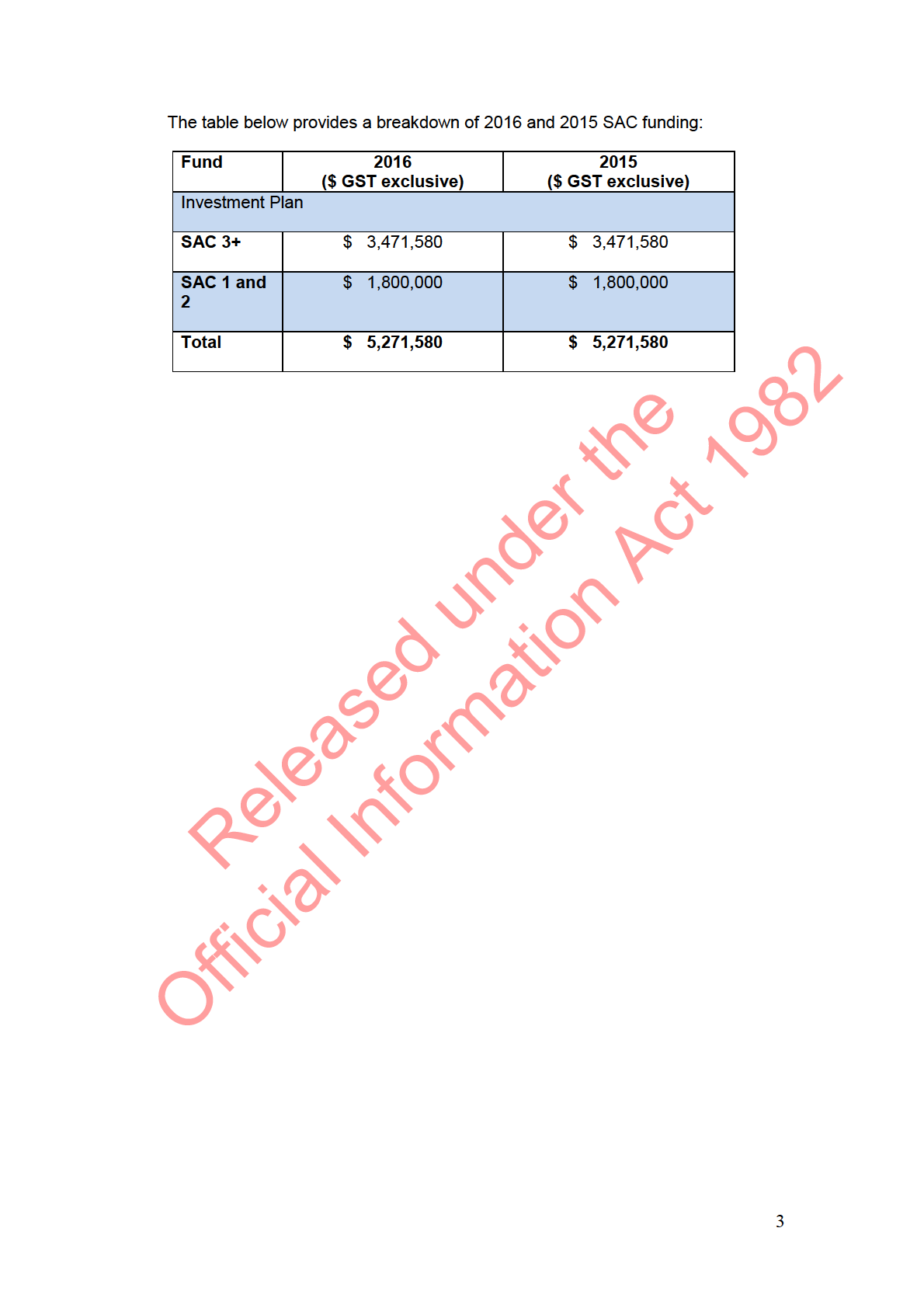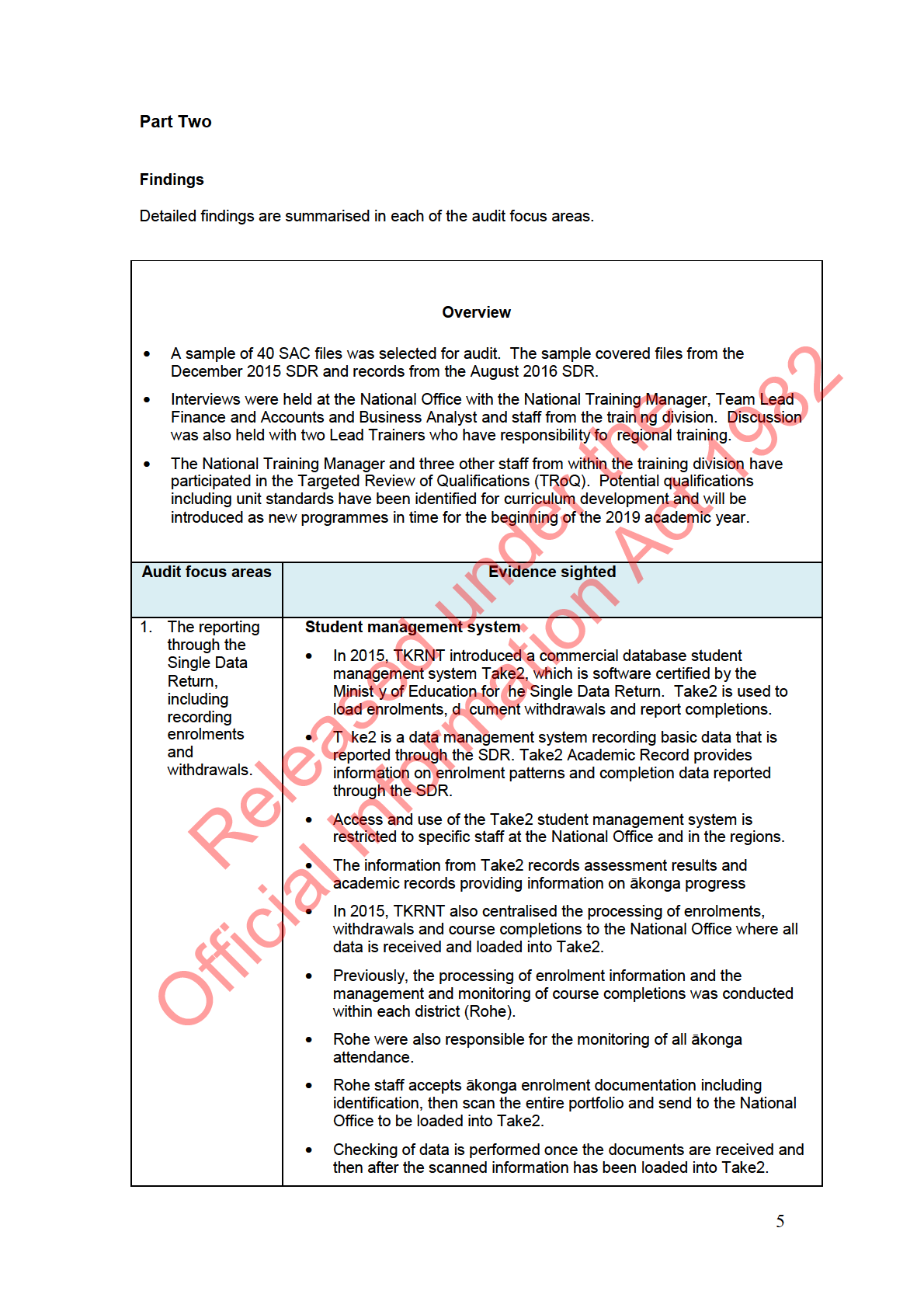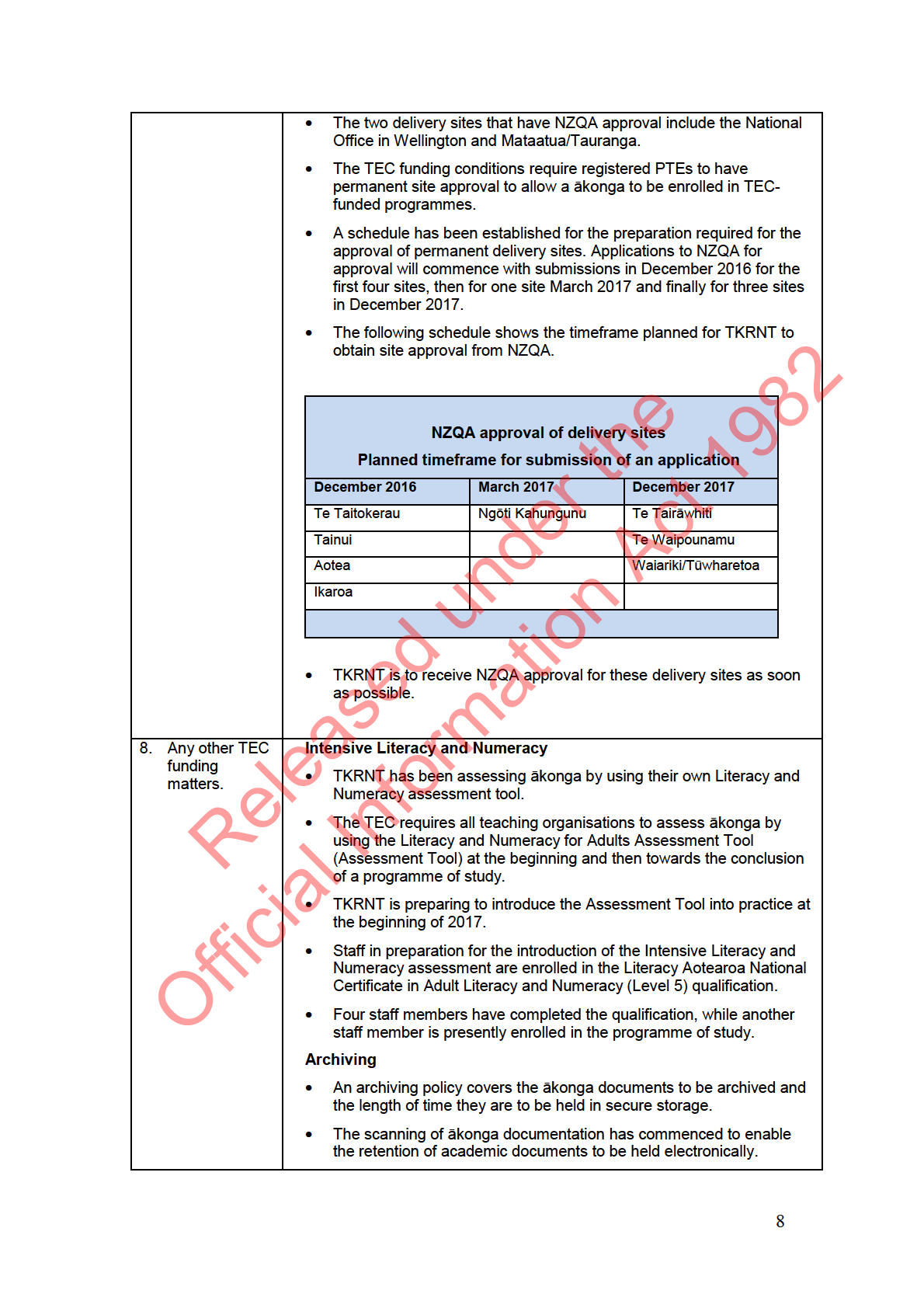
A826322
Tertiary Education Commission
the
1982
Audit Report
Act
under
Te Kōhanga Reo National Trust Board
Student Achievement Component Funding
Information
Released
Official
Edumis Number: 9381
Audit Dates: 20 – 22 September 2016
Draft Report Release Date: 4 October 2016
Final Report Release Date: 4 November 2016
1 Purpose
The purpose of the audit was to provide assurance that Te Kōhanga Reo
National Trust Board (TKRNT) is meeting the Investment Plan Funding
Conditions as referred to in the Tertiary Education Commission (TEC) letters of
approval dated 21 December 2015 and 4 December 2014. The funding approved
refers to Student Achievement Component (SAC) funding.
2 Scope
The scope of the audit was aligned to the performance commitments in the TEC
Investment Plan and the associated funding obligations between the TEC and
TKRNT. The scope was outlined in the audit arrangements letter.
The focus areas included:
The reporting through the Single Data Return (SDR), including recording
enrolments and withdrawals.
The Annual Maximum Fee Movement (AMFM) policy relating to fees and
course costs.
The refund of fees that have been overcharged.
The financial support for the equipment infrastructure required to deliver the
approved qualifications.
Whether inducements or benefits have been provided to students.
Responsibility for subcontracting arrangements.
under the
Compliance with the requirements in Part 18 o the Education Act 1989.
Any other TEC funding matters.
An audit is a snapshot of an organisation’s performance at a particular point in
time and may not, as such, provide a view of ongoing compliance. An audit is
based on sampling and issues may remain undetected. The outcome of this audit
wil contribute to decisions made by the TEC relating to current and future
funding.
3 Background
Released
This audit is part of the TEC’s ongoing monitoring of Tertiary Education
Organisations.
TKRNT is a Māori Private Training Establishment based in Wel ington offering
education in and through Māori language and Mātauranga Māori to whānau and
extended whānau members. Programmes are provided through Te Kōhanga Reo
that are placed throughout Aotearoa. The programmes are funded by the TEC.
The organisation receives SAC funding for the following:
Official Information Act 1982
PC1953 Te Ara Tuatahi Mo Te Reo Māori – Level 2
PC2014 Te Tohu Mātauranga o TeTakaimatua - Level 4
NC5553 Te Takaimatua o Te Kōhanga Reo - Level 4
PC1954 Te Ara Tuatahi Mo Te Reo Māori – Level 5
PC1699 Whakapakari Tino Rangatiratanga - Level 7.
2

4 Key Findings
The key findings were:
In 2015 one ākonga was enrolled in an incorrect programme and then
withdrawn. TKRNT continued to receive SAC funding from this enrolment for
the academic year.
One ākonga was enrolled in a programme by using a marriage certificate as
proof of identity. This is not acceptable evidence to use as identity when
enrolling in a SAC programme.
The withdrawal policy is under review and a timeframe needs to be included to
prevent a lengthy withdrawal period.
The August 2016 course completion rates are below the expected results
required for this time of the year.
The information recorded in Service for Tertiary Education Organisations
(STEO) is not up-to-date including the present programmes being delivered.
the 1982
TKRNT was first registered by NZQA in 1993 as a private training
establishment and has been using a number of delivery sites for providing
teaching programmes.
The TEC requires all teaching organisations to assess ākonga by using the
Act
Literacy and Numeracy for Adults Assessment Tool (Assessment Tool) at the
beginning and then towards the conclusion of a programme of study.
under
5 Recommendations
The main recommendations are:
The continued SAC payment to TKRNT for the incorrectly enrolled student
during 2015 could constitute a repayment to the TEC for the SAC funding
received.
TKRNT may have to repay the SAC funding for the student presenting a
marriage certificate as proof of identity during the enrolment process.
TKRNT needs to report without delay to the TEC that a withdrawal process has
Released
Information
been approved by management.
TKRNT need to focus on completing courses to raise the next SDR submission
to a more acceptable level.
TKRNT is required to correct the information held in STEO promptly.
Applications to NZQA for delivery site approval should be completed as soon as
possible.
Official
TKRNT confirm that they wil introduce the Assessment Tool into practice at the
beginning of 2017.
4

The student management system was evaluated as satisfactory.
Most of the ākonga records in the audit sample were valid enrolments
for funding purposes, domestic status was confirmed and minimum
attendance requirements met.
Student enrolments
A National Student Number 9(2)(a)
was enrolled in an incorrect
programme PC2014 at the beginning of the academic year and was
withdrawn in April 2015. They were re-enrolled in the correct
programme PC1954 at the beginning of 2016.
The ākonga however, was not formally withdrawn from the 2015 SDR
and TKRNT continued to receive full SAC funding for the 2016 year.
This constitutes a repayment to the TEC for the SAC funding received
by TKRNT for the incorrect payment made in 2015.
NSN 9(2)(a)
was enrolled in a PC2014 by using a Ma riage
Certificate as proof of identity. According to the SAC funding
conditions a marriage certificate is not in luded in the l st stated under
SAC3+/016 Verification requirements.
This constitutes a repayment to the TEC for the SAC funding received
by TKRNT for the incorrect payment made in 2015.
Student withdrawals
Policy refers to a withdrawal process to be f l owed when a ākonga
has officially withd awn or TKRNT has not communicated with a
ākonga for som time.
under the
The withdr wal policy is under review and a timeframe needs to be
included to prevent a lengthy withdrawal period.
TKRNT needs to report without delay to the TEC that a withdrawal
process has been approved by management.
Cou se completions
The August 2016 course completion rates are at a lower rate than
expected or this time of the year.
TKRNT has an extensive monitoring process in place and managers
are aware of the present course completion percentage. Staff need to
continue to focus on completing courses to raise the present result to
a more acceptable level.
Released
Services for tertiary education organisations
The information recorded on Service to Tertiary Organisations
(STEO) is not up-to-date including programmes being delivered and
hours of ākonga contact. TKRNT is required to correct the information
held on STEO promptly.
2. The Annual
The Annual Maximum Fee Movement Policy does not apply to
Official Information Act 1982
Maximum Fee
TKRNT as a ākonga enrolled in a programme is not charged any
Movement
student cost or fees.
(AMFM) policy
relating to fees
and course
costs.
6
3. The refund of
A procedure for the refund of ākonga fees is not applicable as
fees that have
TKRNT is not charging ākonga fees or costs.
been
overcharged.
4. The financial
All ākonga were not required to individual y purchase any item of
support for the
hardware or equipment necessary to gain the approved qualification.
equipment
infrastructure
KPMG completed an audit of the 2015 - 2016 annual accounts and
required to
the requirement for a financial report was submitted to the TEC in
deliver the
July 2016.
approved
qualifications.
5. Whether
From the sample of records reviewed there was no evidence of any
inducements or
ākonga being provided with an inducement or benefit to study
benefits have
been provided
to students.
6. Responsibility
TKRNT claimed no subcontracting arrangements are used for any
for
component of the programmes being provided.
subcontracting
arrangements.
Programmes where specific teaching expertise is not readily
available, such as for the business and administration programme
specialised teaching staff are engaged on a fixed term basis.
under the
Teaching staff have been approved on fixed term contracts for the
Napier teaching site, Auckland and Tainui.
7. Compliance
The overal standard of recordkeeping was reviewed as satisfactory.
with the
requirements
Part 18 of the Education Act 1989 includes, but is not limited to
in Part 18 of
ākonga programme information and records.
Education Act
TKRNT has programme approval from NZQA for the programmes
1989.
that are funded by TEC. Copies of NZQA Qualification Overviews
were available for the audit. Original copies of NZQA course approval
documents were not available from NZQA and information held on
Released
NZQA website as reference material was used as a substitute.
One NZQA course approval letter dated July 2014 was provided for a
Type 2 change for the programme Te Tohu Matauranga o Te
Takaimatua.
This programme leads to the National Certificate in Māori Business
and Management – Level 4.
Teaching site approval
Official Information Act 1982
TKRNT was first registered by NZQA in 1993 as a private training
establishment. Since being registered with NZQA ākonga have since
been enrol ed in programmes at the permanent delivery sites.
TKRNT provided the approval documents for two sites and agreed
that a plan is in place to obtain approval for the remaining eight
delivery or teaching sites.
7

the 1982
Act
under
Released
Information
Official
9



